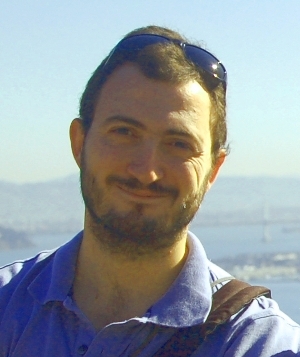Past NIMBioS Postdoctoral Fellow
Erol Akçay
 Dates: August 2009 – July 2011
Dates: August 2009 – July 2011
Project Title: Coordination and negotiation in animal social behavior and interspecific mutualisms
As a NIMBioS postdoctoral fellow,
Erol Akçay (Ph.D. Biology, Stanford University, 2008)
primarily focused on the roles of cooperation and conflict in two different but related systems: social behavior in animals and the evolution of mutually beneficial interactions between species. The general question Akçay focused on was how cooperation within and between species can be maintained in the face of conflicts of interests. In particular, Akçay studied the effects of proximate mechanisms of interaction, such as behavioral motivations and physiological mechanisms, on the evolutionary dynamics of cooperation. Upon completing his fellowship at NIMBioS, Dr. Akçay was a postdoctoral fellow at the Univ. of California, Berkeley in the lab of
Ellen Simms and later accepted a position as an associate research scholar at Princeton University.
He is now an assistant professor of biology at the Univ. of Pennsylvania.
NIMBioS Seminar: The evolution of games and how to play them
Feature Stories
The evolution of social behavior: cooperation and conflict
Can negotiations maintain cooperation in the legume-rhizobium symbiosis?
Video Interview:
Cooperation and conflict
Publications while at NIMBioS
Pringle EG, Akçay E, Raab TK, Dirzo R, Gordon DM. 2013. Water stress strengthens mutualism among ants, trees, and scale insects. PLoS Biology, 11(11): e1001705. [Online]
Akcay E. 2012. Incentives in the family II: Behavioral dynamics and the evolution of non-costly signaling. Journal of Theoretical Biology, 294(7): 9-18. [Online]
Akçay E, Van Cleve J. 2012. Behavioral responses in structured populations pave the way to group optimality. The American Naturalist, 179(2): 257-269. [Online].
Akcay E, Roughgarden J. 2011. The evolution of payoff matrices: Providing incentives to cooperate. Proceedings of the Royal Society B, published online 8 December 2010. [Online]
Mesterton-Gibbons M, Gavrilets S, Gravner J, Akçay E. 2011. Models of coalition or alliance formation. J. Theor. Biol. 274:187-204. [Online]
Akcay E, Simms E. 2011. Negotiation, sanctions, and context dependency in the legume-rhizobium mutualism. The American Naturalist, 178(1): 1-14. [Online]
Sekercioglu CH, Anderson S, Akçay E, Bilgin R, Can E, Semiz G, Tavsanoglu C, Soyumert A, Yokes MB, Ipekdal K, Saglam I, Yucel M, Dalfes N. 2011. Turkey's globally important biodiversity in crisis. Biological Conservation, 144: 2752-2769. [Online].
Akçay E, Roughgarden J. 2010. The evolution of payoff matrices: Providing incentives to cooperate. Proceedings of the Royal Society B. Published online December 8, 2010. [Online]
Roughgarden J, Akçay E. 2010. Do we need a sexual selection 2.0? Animal Behaviour 79(3):e1-e4. [Online]
Roughgarden J, Akçay E. 2010. Final response: sexual selection needs an alternative. Animal Behaviour 79(3):e18-e23. [Online]
Akçay E, Roughgarden J. 2009. The perfect family: biparental care in animals. PLoS ONE, 4:e7345. [Online]
Akçay E, Van Cleve J, Feldman MW, Roughgarden J. 2009. A theory for the evolution of other-regard integrating proximate and ultimate perspectives. PNAS 106:19061-19066. [Online]
Ozpolat BD, Akçay E, Somel N, Somel M. 2010. Bringing the understanding of evolution to Turkish public: A volunteer organization model for developing countries. Developmental Biology, 344(1): 439. [Online].
Presentations while at NIMBioS
Bewick SA, Chisholm RA, Akcay E, Godsoe W. October 2011. Tropical biodiversity: New models for an old problem. Society for Advancement of Chicanos and Native Americans in Science, Modern Mathematics Workshop, San Jose, CA.
Bewick SA, Chisholm RA, Akcay E, Godsoe W. August 2011. 'Neutral' models with overlapping niches. The 2011 Annual Meeting of the Ecological Society of America, Austin, TX.
Participation in NIMBioS Activities
Concurrent with Akçay's postdoctoral appointment, Akçay was Co-PI for the NIMBioS Working Group: Function and Evolution. Akçay also participated in the NIMBioS Working Group: Coalitions and Alliances and the NIMBioS Investigative Workshop: New Soil Black Box Strategies. In addition, Akçay hosted a number of collaborative short-term visitors. Akçay also co-organized a workshop of Turkish ecologists and evolutionary biologists, which was held in Istanbul Technical University, Turkey, in December 2009.
Collaborators
Jeremy Van Cleve (Santa Fe Institute), Ellen Simms (UC Berkeley), Joan Roughgarden (Stanford), Sergey Gavrilets (UTK/NIMBioS), Beth Pringle (Stanford), Sharon Bewick (NIMBioS), Will Godsoe (NIMBioS), Ryan Chisholm (Smithsonian Tropical Research Institute), Cagan Sekercioglu (Univ. Utah), James Fearon (Stanford), Barry Weingast (Stanford), John Ferejohn (Stanford, NYU), Adam Meirowitz (Princeton), Simon Levin (Princeton)
Education, Outreach and Training
Akçay gave a research talk at California State University, San Marcos, a minority-serving institution, and a public seminar about his research in Istanbul, Turkey. Akçay also co-wrote and obtained funding for a small-scale public outreach grant from the European Society for Evolutionary Biology. This continuing project consists of preparing and distributing material promoting the teaching of evolutionary biology, and advertising online resources that Akçay and his collaborators have been developing at http://evrimianlamak.org (the Turkish translation of UC Berkeley's Understanding Evolution website). Akçay also taught two lectures as a guest lecturer in Sergey Gavrilets' graduate level evolutionary theory class at UTK.
Akçay participated in the mathematical biology seminar course on spatial optimization in fall 2009. Akçay also attended the weekly meetings of the Gavrilets and Armsworth labs in UTK's Ecology and Evolutionary Biology Department.
Media Coverage
Providing incentives to cooperate can turn swords into plowshares. Eurekalert
Providing incentives to cooperate can turn swords into plowshares. ScienceDaily, Dec 8 2010.
NIMBioS
1122 Volunteer Blvd., Suite 106
University of Tennessee
Knoxville,
TN 37996-3410
PH: (865) 974-9334
FAX: (865) 974-9461
Contact NIMBioS


